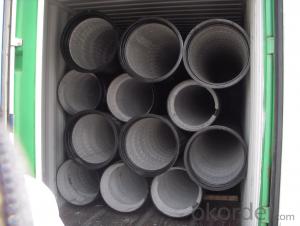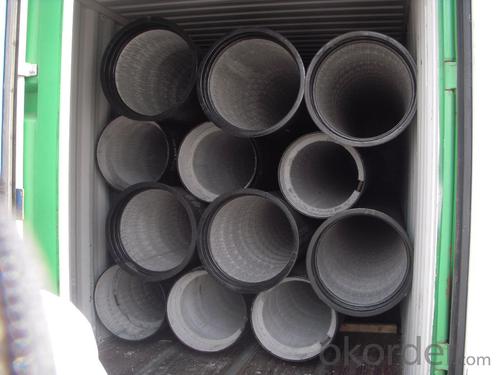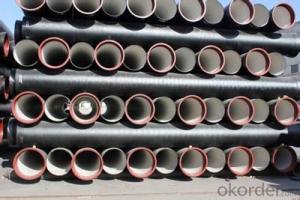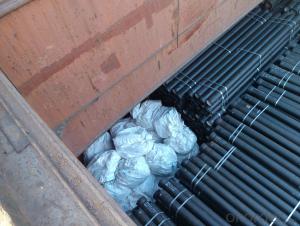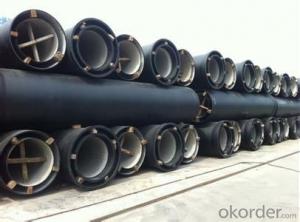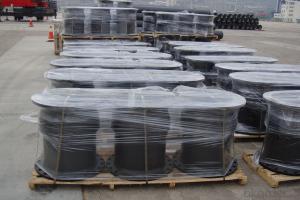DUCTILE IRON PIPE DN800 c
- Loading Port:
- Tianjin
- Payment Terms:
- TT OR LC
- Min Order Qty:
- -
- Supply Capability:
- 30000Tons m/month
OKorder Service Pledge
OKorder Financial Service
You Might Also Like
CNBM ductile iron pipe ranges from DN80-DN1600mm (T-Type, Class K9), effective length 6m, comply with ISO2531 Standard
Company Profile
CNBM International Corporation is the leading production base and renowned supplier of Ductile Iron Water Pipe systems of both potable and waste water in China. We are constantly looking to develop high quality products to ensure the longest service life and wonderful performance.
CNBM Pipelines regard quality as the essential factor leading to successful business. Every pipe is tested in accordance with BS EN545 (water application) or BS EN598 (sewer application). CNBM Pipelines products comply with and are tested according to the relevant European and International Standards. Our pipes are manufactured under the quality management system BS EN ISO 9001. After years of efforts, CNBM Pipelines has built up great reputation in terms of quality and service among customers worldwide
Product Introduction
CNBM ductile iron pipe ranges from DN80-DN1600mm (Tyton, T-Type, Class K7/K8/K9), effective length: 6m, complying with BS EN545/EN598/ISO2531/BS4772.
Specification& Payment terms
Internal lining: Pipes shall have an internal cement mortar lining in acc with ISO4179.
External coating: Pipes shall be externally coated with metallic zinc spray plus a further layer of resin painting to ISO8179.
Gasket: 100% SBR/NBR/EPDM gasket in accordance with ISO4633.
Packing: Pipes from DN100 to DN300 be bundled with steel belts, the others are in bulk.
Payment term: By 30% T/T advance payment + 70% Irrevocable L/C at sight.
Packing: In bulk vessel or in container.
- Q: Are ductile iron pipes suitable for mining applications?
- Ductile iron pipes are indeed suitable for mining applications. This type of cast iron has undergone treatment to enhance its strength, durability, and ductility. Notably, these pipes possess high tensile strength and corrosion resistance, making them an ideal choice for underground mining operations that face harsh conditions. The ability of ductile iron pipes to withstand high pressure and heavy loads is one of their key advantages in mining applications. They exhibit excellent structural integrity and can withstand both internal and external forces, ensuring reliable performance in demanding mining environments. Moreover, ductile iron pipes have a long service life and require minimal maintenance. They offer exceptional resistance to abrasion, which is extremely important in mining operations where abrasive materials such as rocks, minerals, and ores are prevalent. Additionally, the smooth inner surface of these pipes minimizes friction, allowing for efficient transportation of mining materials. Furthermore, ductile iron pipes are a cost-effective option compared to alternatives like steel or concrete. They have a lower upfront cost and require less frequent replacements, resulting in reduced long-term expenses for mining companies. In conclusion, ductile iron pipes are highly suitable for mining applications due to their strength, durability, resistance to corrosion and abrasion, long service life, and cost-effectiveness. These pipes ensure reliable and efficient transportation of mining materials, thereby contributing to the overall efficiency and productivity of mining operations.
- Q: How are leaks repaired in ductile iron pipe?
- Leak repairs in ductile iron pipes are typically carried out using various methods depending on the severity and location of the leak. One commonly used technique is the application of epoxy-based sealants or leak repair clamps. For small leaks, epoxy sealants are commonly used. This involves applying a specialized epoxy compound to the leaking area, which then hardens and forms a durable seal over the leak. The epoxy is carefully applied to the surface of the pipe, covering the leakage point and any surrounding damaged areas. This method is effective for small leaks and can provide a long-lasting solution. In cases where the leak is larger or more severe, leak repair clamps are often employed. These clamps are designed to provide a mechanical seal over the leak, using rubber gaskets and bolts to secure the clamp tightly around the pipe. The pressure from the clamp compresses the gasket onto the pipe, creating a watertight seal and preventing further leakage. Leak repair clamps are available in various sizes to accommodate different pipe diameters. In both cases, it is crucial to properly prepare the pipe surface before applying the repair method. The area around the leak must be cleaned and dried thoroughly to ensure good adhesion of the epoxy or proper sealing with the clamp. Additionally, it is essential to follow the manufacturer's instructions and guidelines for the chosen repair method to ensure a successful and long-lasting repair. It is important to note that these repair methods are temporary solutions and may not be suitable for all situations. In some cases, particularly for extensive pipe damage or aging infrastructure, it may be necessary to replace the affected pipe section entirely. Professional assessment and guidance from qualified technicians or plumbers are recommended when dealing with leaks in ductile iron pipes to ensure proper repairs and minimize the risk of future issues.
- Q: Qianwei County ductile iron pipe which tool to use cutting convenience?
- Cutting the ductile iron pipe by grinding is grinding and cutting the ductile iron tube continuously by grinding wheel until it breaks. To cut ductile iron pipes by grinding cutting method, the cutting parts should be crossed at first so as to avoid deviation during cutting. Place the drawn ductile iron tube in the cutting machine and fix the ductile iron tube and clamp it with a built-in clamp. Next, start the cutting machine and gradually press the handle of the cutting machine. The grinding wheel cuts into the ductile iron tube until the ductile iron pipe is cut off. When exerting pressure on the handle, do not force too hard at once, otherwise it will cause the grinding wheel to break. In the operation of the machine, the operator must not stand on the side of the grinding wheel, so as to avoid accidents. When the wheel appears in cutting, vibration, shaking, uneven phenomenon, should immediately stop the operation, check whether there is the wheel gap, if damaged, must be promptly replaced, to ensure safety and normal. Good cutting ductile cast iron pipe section, if there is to prevent the use of burrs, can be removed by grinding or machining file.
- Q: How are ductile iron pipes tested for quality assurance?
- To guarantee the quality and adherence to industry standards of ductile iron pipes, a variety of testing procedures are carried out. These tests evaluate both the raw materials and the finished products, aiming to ensure the pipes' durability, strength, and overall reliability. The first step involves analyzing the chemical composition of the raw materials used in the manufacturing process. This analysis verifies that the iron, carbon, and other elements fall within the specified range, as different compositions can impact the pipes' strength and resistance to corrosion. Next, mechanical tests assess the pipes' strength and ductility. Tensile tests determine properties like ultimate tensile strength, yield strength, and elongation, which help assess the pipes' ability to withstand external pressure and bending forces. Moreover, impact tests measure the pipe's ability to resist sudden loading or impact. By evaluating the energy absorbed by the pipes under high impact force, these tests ensure that the pipes can endure accidental impacts during installation or operation. Another pivotal test is the hydrostatic pressure test, which examines the pipes' capacity to withstand internal pressure. By subjecting the pipes to a specific pressure for a designated duration while filled with water, this test ensures their capability to handle expected operating pressures without any leakage or failure. Furthermore, dimensional and visual inspections are conducted to verify that the pipes meet the required specifications. These inspections involve checking the outer diameter, length, wall thickness, and overall appearance for any defects, such as cracks, voids, or irregularities. Lastly, corrosion resistance tests evaluate the pipes' ability to resist corrosion when exposed to different environments or fluids. These tests help determine the pipes' expected lifespan and their suitability for various applications. In conclusion, these quality assurance tests are vital in ensuring that ductile iron pipes adhere to the necessary standards and deliver dependable, long-lasting performance in diverse infrastructure projects.
- Q: Are ductile iron pipes suitable for use in cooling water systems?
- Yes, ductile iron pipes are suitable for use in cooling water systems. They offer excellent strength, durability, and corrosion resistance, making them ideal for transporting water at varying temperatures. Additionally, their flexibility allows them to withstand pressure and temperature changes, ensuring long-lasting and reliable performance in cooling water applications.
- Q: Can ductile iron pipes be used for underground cable conduits?
- Yes, ductile iron pipes can be used for underground cable conduits. Ductile iron pipes are known for their strength, durability, and resistance to corrosion, making them suitable for various applications including underground cable conduits. They have the ability to handle heavy loads and provide protection to the cables from external elements. Additionally, ductile iron pipes have a long lifespan, reducing the need for frequent replacements and maintenance. However, it is important to consider factors such as depth of burial, soil conditions, and specific requirements of the cable installation before choosing ductile iron pipes for underground cable conduits.
- Q: How are ductile iron pipes protected against stray electrical currents?
- To safeguard water and sewer systems, ductile iron pipes are shielded from stray electrical currents through a technique called cathodic protection. This process entails the application of a low-voltage direct current (DC) to the pipes, generating a defensive electrical field around them. To achieve cathodic protection, sacrificial anodes or impressed current systems are installed near the ductile iron pipes. Sacrificial anodes, composed of a more electrically active metal like zinc or magnesium, are connected to the pipes and act as the electrical current source. Over time, these anodes corrode, sacrificing themselves to shield the pipes from corrosion caused by stray electrical currents. However, impressed current systems utilize an external power source to supply the protective electrical current. Rectifiers are employed to convert alternating current (AC) to direct current (DC), which is then administered to the pipes through anodes. This approach provides greater control over the amount of current applied, ensuring optimal protection. In both scenarios, the electrical current flowing through the sacrificial anodes or impressed current systems establishes a protective barrier around the ductile iron pipes. This barrier impedes the flow of stray electrical currents through the pipes, thus diminishing the risk of corrosion and prolonging the infrastructure's lifespan. Regular monitoring and maintenance of the cathodic protection system are crucial to uphold its efficacy. This involves inspecting the anodes, assessing the levels of electrical current, and making any necessary adjustments or replacements to maintain the desired level of protection. To summarize, cathodic protection is a dependable and widely utilized method for safeguarding ductile iron pipes against stray electrical currents. By preserving the integrity and longevity of water and sewer systems, it plays a vital role in ensuring their functionality.
- Q: Usage of ductile iron pipe expander
- Ductile iron expansion is mainly provided with large flexible, easy installation, the product main material for nodular cast iron, nodular cast iron is mainly through spheroidization and inoculation by spherical graphite, effectively improve the mechanical properties of cast iron, especially the plasticity and toughness increased, resulting in higher than the strength of carbon steel. The material mainly has high strength of plasticity and toughness, and its development at home and abroad is very fast, the output has exceeded cast steel and malleable cast iron, become second only to gray cast iron casting alloy material. Spheroidal graphite is obtained by spheroidizing and inoculation of nodular cast iron. It can effectively improve the mechanical properties of cast iron, especially improve the plasticity and toughness, so as to obtain higher strength than carbon steel.
- Q: What is the expected leakage rate of ductile iron pipes?
- The expected leakage rate of ductile iron pipes can vary depending on various factors such as the age and condition of the pipes, the quality of installation, and the presence of any external factors that may impact the integrity of the pipes. However, in general, ductile iron pipes are known for their durability and low leakage rates compared to other types of pipes. According to industry standards and studies, the expected leakage rate of well-maintained and properly installed ductile iron pipes is typically less than 0.5 liters per pipe per day (LPPD). This leakage rate is considered acceptable and meets the requirements set by various regulatory bodies and organizations. It is important to note that regular maintenance and inspections are crucial in maintaining the low leakage rate of ductile iron pipes. By identifying and repairing any potential leaks or damages promptly, the overall leakage rate can be effectively minimized. Furthermore, advancements in manufacturing techniques and improvements in pipe design have led to the development of more leak-resistant ductile iron pipes. These pipes may have even lower expected leakage rates than the industry average, further enhancing their overall performance and reliability. Ultimately, while the expected leakage rate of ductile iron pipes can vary, it is generally considered to be low when properly installed and maintained, making them a reliable choice for various water distribution and transmission systems.
- Q: Are ductile iron pipes suitable for use in oil refineries?
- Yes, ductile iron pipes are suitable for use in oil refineries. Ductile iron is a type of cast iron that offers a unique combination of strength, durability, and flexibility, making it an excellent choice for various applications, including oil refineries. One of the key advantages of ductile iron pipes is their high tensile strength, allowing them to withstand the high pressure and stress commonly found in oil refining processes. This strength is crucial for the transportation of various fluids, including crude oil, refined petroleum products, and chemicals within the refinery. Additionally, ductile iron pipes have excellent corrosion resistance properties, making them highly resistant to the corrosive effects of oil, chemicals, and other substances typically present in oil refineries. This corrosion resistance ensures the longevity and reliability of the pipes, reducing the need for frequent maintenance and replacement. Furthermore, ductile iron pipes have exceptional ductility, which means they can absorb and withstand significant impacts and vibrations without fracturing or breaking. This quality is advantageous in oil refineries where there may be frequent movement or potential stressors due to machinery, equipment, or ground settlement. Moreover, ductile iron pipes have a smooth interior surface that reduces friction, allowing for efficient fluid flow and minimizing pressure loss. This characteristic is essential in oil refineries, as it helps optimize the transportation of fluids, ensuring a smooth and reliable production process. In conclusion, ductile iron pipes are suitable for use in oil refineries due to their high tensile strength, corrosion resistance, ductility, and smooth interior surface. These pipes provide a reliable and durable solution for transporting various fluids within the refinery, contributing to the efficient and safe operation of oil refining processes.
Send your message to us
DUCTILE IRON PIPE DN800 c
- Loading Port:
- Tianjin
- Payment Terms:
- TT OR LC
- Min Order Qty:
- -
- Supply Capability:
- 30000Tons m/month
OKorder Service Pledge
OKorder Financial Service
Similar products
Hot products
Hot Searches
Related keywords
